To lift Him up, to preach His name, and to invite souls to love Him and to follow Him is the highest, heavenliest privilege of human life.
—W. A. Criswell—
Key point: In crafting and contending for the adoption of Resolution 9, members of the 2019 SBC Resolutions Committee have inadvertently worked against the very cause they say they are trying to promote. So have all those who supported and voted for the resolution itself. This post highlights two devastating implications of the statement Southern Baptists made about critical race theory and intersectionality at their 2019 annual meeting in Birmingham, Alabama.
A woman walked into a travel agent’s office and explained she was there to get assistance planning a vacation for the members of her family—her son, daughter, and husband. She explained she wouldn’t be traveling with them but wanted them to have a vacation they thoroughly would enjoy.
The woman and the agent talked through all the details—including the specific days involved, modes of travel, hotels, meals, and scenic attractions. After the agent had made arrangements for the last detail, she saw that the woman was getting up to leave and said to her, “Sometime, Ma’am, perhaps we can plan your vacation as well.”
The woman smiled and replied, “Thank you! You just did!”
Accomplishing Something by Doing Something Else
It often is the case that in doing a particular thing, people accomplish something else without realizing it. They may even inadvertently be doing something that would have made them pause and reevaluate the entire project. I believe this has been especially true with Resolution 9, which recently was adopted at the Southern Baptist Convention in Birmingham, Alabama. Resolution 9—On Critical Race Theory (CRT) and Intersectionality (INT), authorizes the use of these two approaches as “analytical tools” to understanding human relationships, as long as they are used under the authority of Scripture.
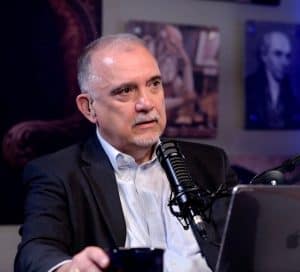
As we pointed out last time, CRT and INT, as well as wokeness, are social justice, worldview ideologies—not merely analytical tools. Florida pastor Tom Ascol, who sought to amend Resolution 9 at the convention, emphasized this very point in a Founders Ministries podcast following the SBC’s annual meeting. Ascol and co-host Jared Longshore had just heard a recording of Ascol’s attempt to amend the resolution, as well as Resolutions Committee Chairman Curtis Woods’s response. Dr. Woods called the proposal “unfriendly” and stated the committee, through Resolution 9, was endeavoring “simply to say that critical race theory and intersectionality are simply ana-ly-tic-al tools and are to be used as tools, not as a worldview.” When Woods said this, messengers could hear Ascol in the background say, “It’s not true.” Both the text and audio of each man’s statement are available here. Listen now to what the Florida pastor said to Jared Longshore about Dr. Woods’s response to his proposal.
Yeah, that was disappointing. You could hear me speaking into the mic — they left my mic hot, I guess — “it’s not true,” and my point in saying “it’s not true” is that intersectionality and critical race theory are not simply analytical tools, which is what Curtis [Woods] said. I mean you might use them, and they might be classified as analytical tools, but they are not simply analytical tools. That is patently on its face not true. And now Curtis said that it was the aspiration of the committee to say that critical race theory and intersectionality are simply analytical tools. Well, congratulations—the committee did that. They were successful in their aspirations. Those were met, but in doing so, I believe what has happened is the Convention has been misled, because these are not simply analytical tools.
Why are they not merely tools? Because CRT and INT make assumptions about people and groups that inform and drive users of these ideologies to reach certain conclusions. CRT says
that race, instead of being biologically grounded and natural, is socially constructed.…[It further says] that race, as a socially constructed concept, functions as a means to maintain the interests of the white population that constructed it. According to CRT, racial inequality emerges from the social, economic, and legal differences that white people create between “races” to maintain elite white interest in labour markets and politics and as such create the circumstances that give rise to poverty and criminality in many minority communities.
Therefore, critical race theory assumes oppression by whites against people of color. The stereotypical traits of the “most oppressive” group include being straight, white, and male.
is discrimination based on overlapping layers of individual classes of discrimination. It’s when a person is subjected to discrimination for more than one classification such as a woman who is black and lesbian. She would classify, under this line of reasoning for three basic discriminatory marks—being a woman, who is black, and is also a lesbian. According to the definition of intersectionality, where these three marks “intersect” is the focus of her greatest and most severe discrimination which places her at the greatest risk of oppression in our culture.
These insights are consistent with what we learned last time about these ideas. Go here to be reminded of how we defined critical race theory and intersectionality, as well as a related term, wokeness, in our previous post.
Contrary to Scripture
Can you see how use of these belief systems to interpret human relationships readily can and will create and exacerbate tensions between various groups in society? If you’re a member of an “oppressive” group, you’re guilty of oppression, whether or not you are guilty of it personally. Likewise, if you’re a member of a group that has been or is being “mistreated” — or a member of several such groups — you are a victim, even if you personally haven’t faced the brunt of the “oppression” that is supposed to be embedded in society.
This is not the way Scripture describes or explains the human condition or human relationships. Yes, certainly people have been oppressed at various times and in various ways throughout history; and yes, oppression is wrong and produces real victims. The point here, however, is that biblically speaking, this isn’t humanity’s core problem.
Good Intentions, Severe Consequences

There’s more. In a series of tweets, Trevin Wax, who served on the Resolutions Committee, explained from his perspective why the resolution, as it was worded, was not problematic. The tweets in the series included this one.
When missiologists do demographic and statistical work, they must understand the overlapping identities or perspectives of the people they seek to evangelize.…
We see in Wax’s statement one of the underlying reasons the committee framed the resolution as it did—evangelism. This element is evident as well in Curtis Woods’s response to Dr. Ascol’s proposed amendments, Dr. Woods said,
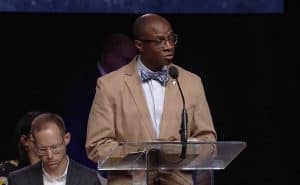
When you begin to think about worldviews and philosophical constructs—the apostle Paul appealed to the Epicurean sensualists. He appealed to the rationalists on Mars Hill. But that did not mean that Paul imbibed the views of the rationalists or the sensualists.
Dr. Woods was referring to Acts 17:22-34 where Paul quoted from Epimenides, a poet who said, “for in Him we live and move and have our being,” and Aratus, who said, “For we are also His offspring.” (Later, in Titus 1:12, Paul again would quote from Epimenides.)
The apostle found common ground with the Athenians. He took true, yet general, statements from Cretan and Cilician poets and used them to bring his hearers to a recognition of the truths God had revealed about Himself in nature, then in Scripture, and ultimately in Christ. Is this the same kind of thing we could do with insights gleaned from CRT and INT? I don’t believe it is.
God’s Assessment of the Human Condition
The Bible teaches that in an ultimate sense, only one individual ever was genuinely oppressed. Only one was a victim of blatant injustice. Only one has been treated wrongfully in an absolute sense. That individual is Jesus Christ. In the Bible in Isaiah 53, the prophet Isaiah described the supreme injustice that would belong to the Savior 700 years later as he laid down His life to redeem humanity.
3 He is despised and rejected by men,
A Man of sorrows and acquainted with grief.
And we hid, as it were, our faces from Him;
He was despised, and we did not esteem Him.

4 Surely He has borne our griefs
And carried our sorrows;
Yet we esteemed Him stricken,
Smitten by God, and afflicted.
5 But He was wounded for our transgressions,
He was bruised for our iniquities;
The chastisement for our peace was upon Him,
And by His stripes we are healed.
6 All we like sheep have gone astray;
We have turned, every one, to his own way;
And the LORD has laid on Him the iniquity of us all.
7 He was oppressed and He was afflicted,
Yet He opened not His mouth;
He was led as a lamb to the slaughter,
And as a sheep before its shearers is silent,
So He opened not His mouth.
8 He was taken from prison and from judgment,
And who will declare His generation?
For He was cut off from the land of the living;
For the transgressions of My people He was stricken.
9 And they made His grave with the wicked—
But with the rich at His death,
Because He had done no violence,
Nor was any deceit in His mouth.
He was oppressed and He was afflicted,
Yet He opened not His mouth;
He was led as a lamb to the slaughter,
And as a sheep before its shearers is silent,
So He opened not His mouth.
—Isaiah 53:7—
Isaiah’s words are entirely consistent with the events surrounding Jesus’ death. After the Lord Jesus died and returned to life, Paul wrote about the sacrifice He had made, not just when He was crucified, but also when He left the glories of heaven for earth.
5 Let this mind be in you which was also in Christ Jesus, 6 who, being in the form of God, did not consider it robbery to be equal with God, 7 but made Himself of no reputation, taking the form of a bondservant, and coming in the likeness of men. 8 And being found in appearance as a man, He humbled Himself and became obedient to the point of death, even the death of the cross (Phil. 2:5-8).
Jesus Christ was oppressed, but by whom? Isaiah tells us. He bore “our griefs…our sorrows…our transgressions…[and] our iniquities” (emphasis added). And we—all the members of the human race, without exception—are guilty of countless transgressions and iniquities. Yet Jesus had none. We—again, all of us—are Christ’s oppressors. And despite the extreme injustice involved, God arranged for “Him who knew no sin to be sin for us, that we might become the righteousness of God in Him” (2 Cor. 5:21). Since Christ paid the penalty for humanity’s transgressions, anyone who repents of his or her sins and asks God to credit Jesus’ death to his or her account receives divine forgiveness, eternal life, and “the right to become children of God.”

The Gospel Liberates, Even as Social Justice Enslaves
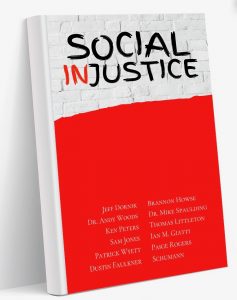
This is the true gospel of Christ, the best news you ever will hear—and it blows the social justice narrative to smithereens! All of humanity—not just whites—are oppressors in this ultimate sense; and Jesus is the one we’ve oppressed. Yet He did not tout His status as a victim. Instead, He laid down His life for the eternal benefit of all who would trust Him as Savior. Furthermore, rising from the dead, He became the supreme Victor, for death is humanity’s ultimate enemy. These ideas will be fleshed out in a chapter by Pastor Sam Jones in a soon-to-be-released book titled Social Injustice. You can learn more about the book and can order it here.
When we understand these truths, we realize the fundamental conflict in the world isn’t whites against blacks, whites against minorities, or any other human conflict. No! The fundamental conflict is man against God; but God turned the tables on those hostilities by sending His Son to be executed in the place of rebellious humanity. Therefore, the injustice Jesus experienced became for all of humanity a gracious act of God.
A Sharp Contrast
The fuel for the social justice movement, which is rooted in cultural Marxism, is the animosity that arises from pitting one social group against another. Social justice assessments breed bitterness, envy, and hatred. For the so-called “oppressed,” they give rise to feelings of victimhood and incite finger-pointing and demands for retribution. And for the “oppressors,” they produce an unbearable load of guilt without any relief in sight. How can a man atone for sins of which his ancestors are guilty? How can a woman make amends for offenses her forebears may or may not have committed? How can anyone repent of sins for which he or she is not personally at fault?
Contrast this to the authentic gospel, which brings about genuine reconciliation between God and man, and consequently between people, even people of different races, ethnicities, and social classes. In Romans 1:16, Paul wrote, “I am not ashamed of the gospel of Christ, for it is the power of God to salvation for everyone who believes, for the Jew first, and also for the Greek” (emphasis added). The gospel brings people together as does no other force in heaven or on earth. As Paul wrote to the Christians in Colossae,
The gospel brings people together as does no other force in heaven or on earth.
8 But now you yourselves are to put off all these: anger, wrath, malice, blasphemy, filthy language out of your mouth. 9 Do not lie to one another, since you have put off the old man with his deeds, 10 and have put on the new man who is renewed in knowledge according to the image of Him who created him, 11 where there is neither Greek nor Jew, circumcised nor uncircumcised, barbarian, Scythian, slave nor free, but Christ is all and in all.
12 Therefore, as the elect of God, holy and beloved, put on tender mercies, kindness, humility, meekness, longsuffering; 13 bearing with one another, and forgiving one another, if anyone has a complaint against another; even as Christ forgave you, so you also must do. 14 But above all these things put on love, which is the bond of perfection. 15 And let the peace of God rule in your hearts, to which also you were called in one body; and be thankful. 16 Let the word of Christ dwell in you richly in all wisdom, teaching and admonishing one another in psalms and hymns and spiritual songs, singing with grace in your hearts to the Lord. 17 And whatever you do in word or deed, do all in the name of the Lord Jesus, giving thanks to God the Father through Him (Col. 3:8-17).1
No wonder Texas pastor Tom Buck declared that critical race theory and intersectionality aren’t

merely insufficient [to diagnose and redress the root causes of the social ills that they identify]; they’re incapable of diagnosing man’s problem and incompatible with the biblical gospel.
Critical Race Theory is based upon Marxism—a godless intellectual foundation, and both include a praxis contradictory to the gospel of Jesus Christ. These views do not complement the gospel; they completely contradict it. Paul wrote in Colossians 2:6-8, “As you received Christ Jesus the Lord, so walk in Him, rooted and built up and established in your faith, just as you were taught, abounding in thanksgiving. See to it that no one takes you captive by philosophy and empty deceit, according to human tradition.”
Therefore, when it came to worldly philosophy and human tradition, Paul did not tell the Colossians to adopt or to adapt, but to abandon.
Let’s Not Add to the Gospel, Even Unintentionally
Because sin and death are universal, the need for salvation in Christ also is universal. More than anything else, this need transcends barriers of race, ethnicity, culture, status, and nationality. People don’t need to be told they’ve been oppressed by society. They rather need to be informed that they have offended God individually. Likewise, people don’t need to hear that they must repent of sins they themselves haven’t committed. They bear true guilt for plenty of sins as it is! Nor do they need to hear that their supreme sin is one of a supposed “privilege” they had nothing to do with acquiring and cannot discard simply because they are white. They may indeed be guilty of racism, bigotry, or acting unfairly against individuals or groups because of prejudging them based on external traits. All of these are sins God will judge, and people must realize just how precarious a position they’re in before a righteous God, directly because of these and other sins. Here’s the main point. All of us stand guilty before God, and we stand before Him without excuse. Our offenses against one another ultimately are sins against the Lord. Each one of us desperately needs forgiveness in Christ.
While I’m sure all the members of the Resolutions Committee would agree with what I’ve said here, I have to wonder if they’ve acted in a way that conveys something they didn’t mean to say, even as they said a great many other things with resolute intention. We’re going to highlight two specific things momentarily. Hang tight! We’re almost done!
Only the Bible Accurately Assesses the Human Condition and Points to the Real Remedy
Paul wrote this to the Corinthian Christians in 2 Corinthians 5:14-16 (NIV),
14 For Christ’s love compels us, because we are convinced that one died for all, and therefore all died. 15 And he died for all, that those who live should no longer live for themselves but for him who died for them and was raised again.
16 So from now on we regard no one from a worldly point of view. Though we once regarded Christ in this way, we do so no longer (emphasis added).
Then, just a few strokes of his pen later, Paul wrote these verses (one of which we’ve already quoted).
20 We are therefore Christ’s ambassadors, as though God were making his appeal through us. We implore you on Christ’s behalf: Be reconciled to God. 21 God made him who had no sin to be sin for us, so that in him we might become the righteousness of God (NIV),
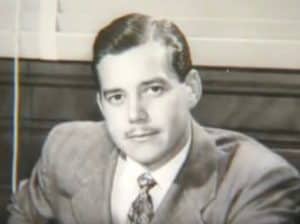
Christians, including Southern Baptists, do not need critical race theory, intersectionality, wokeness, or any other secular ideology to win people to Christ. Rather, they need to uphold Christ and the good news of the gospel. Whenever they do, people will respond. Not everyone, but some. We must refrain from manipulating the platform to increase the number ourselves. “Successful witnessing,” Campus Crusade for Christ founder Bill Bright used to say, “is simply sharing Christ in the power of the Holy Spirit and leaving the results to God.”
Successful witnessing is simply sharing Christ in the power of the Holy Spirit and leaving the results to God.
—Dr. Bill Bright—
We will do well to recall that Christ Himself said, “and I, if I am lifted up from the earth, I will draw all peoples to Myself.” The Gospel writer added a brief statement of explanation to help us more fully understand. John wrote, “This He said, signifying by what death He would die.” Even so, we can make a point of application here that cannot be far off. When we lift Jesus up by proclaiming Him and presenting the gospel, people will come. As the Lord Himself said through Isaiah the prophet in Isaiah 55:10-11, “My word…shall not return to me void, but it shall accomplish what I please, and it shall prosper in the thing for which I sent it.”
Unintended Consequences
So, what messages have the members of the Resolutions Committee and Southern Baptists who voted for Resolution 9 risked sending, even as they declared in writing that God’s Word is “the first, last, and sufficient authority with regard to how the Church seeks to redress social ills, and we reject any conduct, creeds, and religious opinions which contradict Scripture”? These insights may sound harsh, but I believe they are accurate.
First, Resolution 9 and those who have supported it have inadvertently insulted blacks and other minorities by implying that to reach them evangelistically, Southern Baptists may need to employ belief systems or even “tools” that have led people to unbiblical conclusions. Minorities do not need to be so “coddled,” nor even coddled at all! They are like everyone else with regard to their sinful condition and their need of Christ. Share the gospel with them, and watch them respond! I may be oversimplifying the situation, but not by much. Do we as Christians really believe in the power of the gospel, and in the power of the Holy Spirit to convict the human heart?
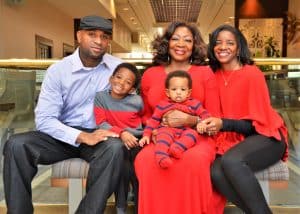
Second, Southern Baptists who support Resolution 9 are unintentionally slamming the gospel itself, as well as God’s Word in a larger sense. Last time we quoted Pastor Josh Buice, and here we need to cite him once again. Dr. Buice wrote,
If CRT and intersectionality are insufficient alone to diagnose social ills, what about the Scriptures—are they insufficient alone to diagnose social ills? In a day where we’ve already watched the evangelical world attach woke to church—now the SBC has attached woke to the Scriptures.
These actions carry dangerous implications! We must repudiate any and all ungodly philosophies and belief systems, including—and now perhaps especially—the religion of social justice, a religion that includes CRT, INT, wokeness, and numerous other unbiblical ideologies.
The Importance of Sensitivity and Compassion on the Part of White Christians
Having said all of that, I would hasten to ask you—please do not misunderstand. None of this is to say that we as Christians can afford to overlook the cultures, sub-cultures, or perspectives often held by blacks or other minorities as we seek to effectively reach them for Christ. White Christians have a responsibility to be sensitive to the obstacles blacks and other minorities face in their everyday lives. In a recent Conversations That Matter podcast, host Jon Harris interviewed Tom Buck and Jared Longshore. At 32 minutes and 27 seconds in, Longshore says this:

It is true that in our land, African-American people have suffered greatly. The sin of racism has been against them, throughout slavery, and Jim Crow, and all of that. And so, should we not listen to people that have experienced something that we haven’t? Well, absolutely we should! Right? A pastor comes out and says, “We need to have an open ear!” You know, ’cause look—if you’re a white person, you haven’t experienced some of these things. Used to be, people [would] have an open ear, be patient, people [would] listen. Be quick to listen, slow to speak. I don’t want someone going, “Oh! He’s a critical race theorist!”
Thankfully, slavery, Jim Crow, lynchings, and various other racist atrocities no longer occur in America. But that’s not to say racism against blacks and other minorities doesn’t ever rear its ugly head. Indeed, it has and it does. Jared Longshore is right. Whites—especially white believers—must listen to minorities and work to make sure they have equal opportunities in a free American society.
We don’t need CRT and INT to do this! We don’t need any social justice ideology to look individuals in the eye and listen to them intently and with concern; nor do we need any of these belief systems to contend for true biblical justice2 in our churches and in society.
And true biblical justice is what we desperately need.
May God enable us to uphold Christ and the gospel always, even as we reach out to evangelize people of all races and ethnicities, working with other Christians across racial and ethnic lines as we do.
To access additional Word Foundations articles on social justice, go here.
Copyright © 2019 by B. Nathaniel Sullivan. All rights reserved.
Unless otherwise indicated, Scripture passages have been taken from the New King James Version®. Copyright © 1982 by Thomas Nelson, Inc. Used by permission. All rights reserved.
Passages marked NIV taken from the Holy Bible, New International Version®, NIV® Copyright © 1973, 1978, 1984, 2011 by Biblica, Inc.® Used by permission. All rights reserved worldwide.
Notes:
1Hear Dr. James White expound on these verses and their implications for the woke movement here.
2Exercising authentic biblical justice means “rendering impartially and proportionally to everyone his due in accord with the righteous standard of God’s moral law.”
top photo credit: Saint Paul delivering the Areopagus Sermon in Athens, by Raphael, 1515
photo credit, Bill Bright: Bill Bright – “I Wouldn’t Change a Thing” on You Tube
photo credit: Isaiah in stained-glass
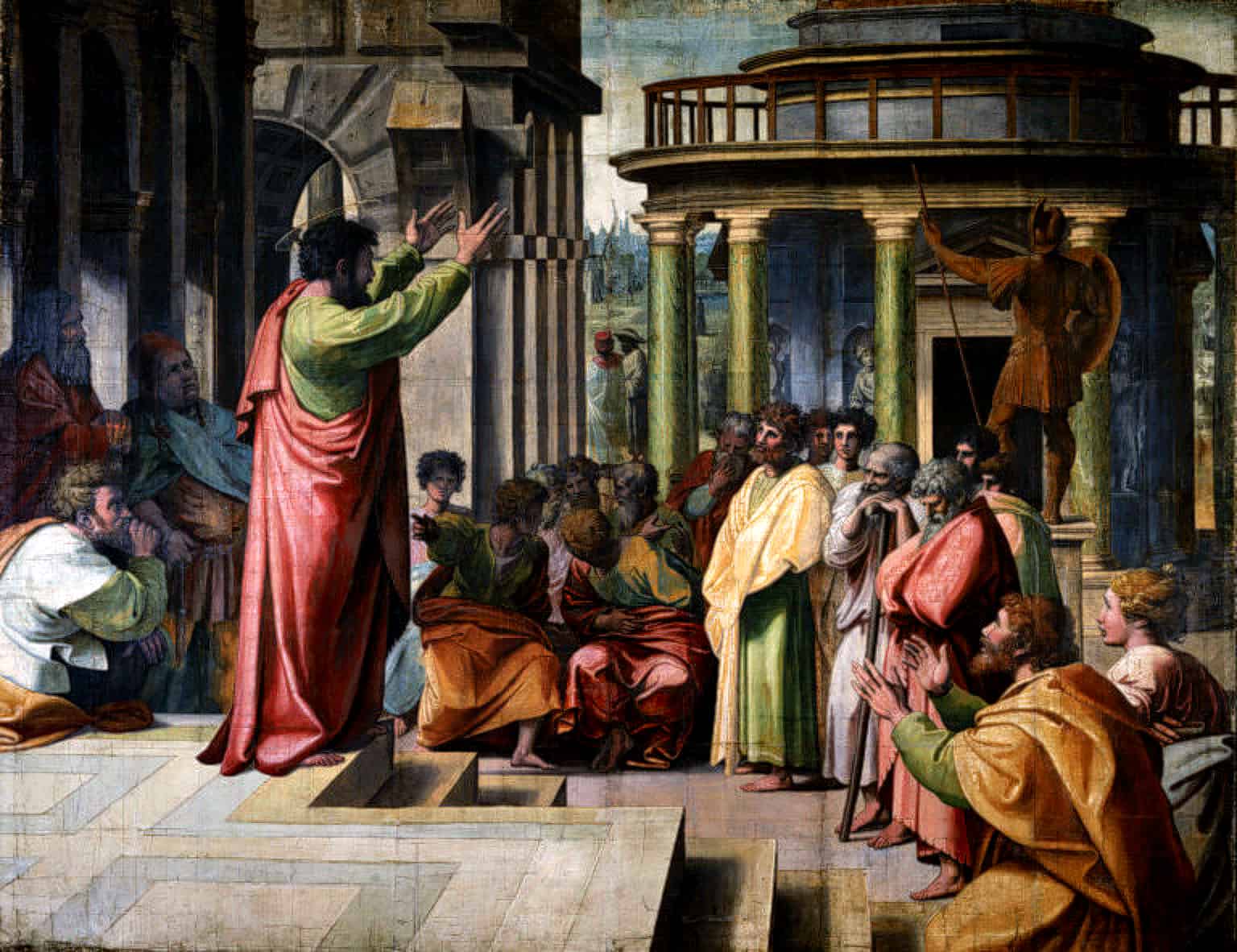
Be First to Comment